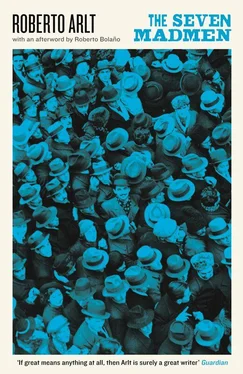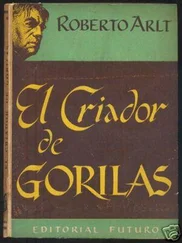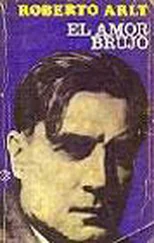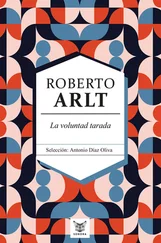“D’you remember? You said I looked like an idiot? Don’t say a word. You had no idea how much I was suffering. Neither you nor her. The fact is, I am sad. It’s you and her who have got me into all this. I don’t even know why I’m talking to you. All I know is I’m so weary. What’s the point …”
He was about to leave the stable when the Astrologer appeared. Barsut glanced anxiously at his hands; the Astrologer settled his hat on the back of his head, took the lamp, blew it out, and sat down on a trunk. He began:
“I came to see you to sort out the cheque business. You must know that’s why we kidnapped you. Of course, I wouldn’t be talking to you like this if it weren’t for the fact that in a notebook we found in your pocket — which I prevented Erdosain from burning 1— I read a simply amazing thought: ‘Money makes a god of man. Therefore Ford is a god. And if he is a god, he can destroy the moon.’”
It was a complete fabrication, but Barsut did not react.
Erdosain was studying the Astrologer’s impenetrable oblong face. It was obvious he was putting on an act, and that Barsut was not taken in by it, convinced he was being duped.
The Astrologer went on:
“At first, I thought that observation of yours was just another of the pathetic remarks scattered throughout your jottings … and yet in the end, despite myself, I began to wonder why money can make a god of a man, and suddenly I realised you had hit upon a fundamental truth. And do you know how I could prove you were right? Because I thought that thanks to his fortune Henry Ford would be able to buy enough explosives to blow up a planet such as the moon. So your proposition was correct.”
“Of course,” growled Barsut, secretly pleased at the praise.
“And then I realised that not only the entire classical world, but writers of every age — except for yourself, who had stumbled on that truth without knowing how to take advantage of it — all of them had been unable to realise that men like Ford, Rockefeller or Morgan were capable of destroying the moon … that they had the power to do so … a power which, as I say, many mythologies attribute to a creator god. So, unknowingly, you were laying the foundation for the realm of the superman.”
Barsut turned to observe the Astrologer. Erdosain realised he was speaking seriously.
“So, when I understood that thanks to the power money gave them, Morgan, Rockefeller or Ford were like gods, I also understood that social revolution would be impossible here on earth, because a Rockefeller or a Morgan could wipe out a race with a snap of their fingers, just as you trample on an ant-hill in your garden.”
“So long as they had the courage to do it.”
“The courage? What I was wondering was whether a god could renounce his powers … if copper kings or oil barons would ever allow themselves to be stripped of their fleets, mountains, their gold or their wells. I saw that for this to happen they would need to be as spiritual as a Buddha or a Christ … and that gods like these who had all the power would never accept being dispossessed. For that, something truly extraordinary would need to happen.”
“I don’t follow you … I jotted that idea down for completely different reasons.”
“That doesn’t matter. The extraordinary thing is this: humanity, masses all over the earth, have lost their faith. I don’t mean the Catholic faith. I mean all religious belief. So men are bound to say to themselves: ‘What are our lives for?’ Once science has extinguished all faith, nobody will want to go on with a purely mechanical existence. And the moment that this phenomenon occurs, an incurable plague will return to the earth … the plague of suicide … Can you picture a world of desperate people, their brains shrivelled, lost in the caverns of our gigantic cities, wailing at the foot of concrete walls: ‘What have they done to our God?’ And young girls and schoolkids organising secret societies where they practise the sport of suicide? Or men refusing to have any children, despite Berthelot’s naive prediction that they could all be fed with synthetic pills?”
“That sounds a bit far-fetched,” said Erdosain.
The Astrologer turned towards him in amazement. He had completely forgotten his existence.
“Of course, none of this will happen until mankind discovers the source of its unhappiness. That’s what went wrong with the revolutionary movements based on economics. Judaism sniffed at the world’s debit and credit entries and concluded: ‘Happiness is bankrupt because mankind lacks the wherewithal to meet its needs …’ whereas the true conclusion is that ‘happiness is bankrupt because mankind lacks gods and faith’.”
“Now you’re contradicting yourself! You said before that …” protested Erdosain.
“Be quiet: what d’you know anyway? So then I realised that this was the dreadful metaphysical sickness everyone is suffering from. Man’s happiness depends on a metaphysical lie … if you deprive him of that lie, he will turn to economic illusions … and then it came to me that the only ones who could restore man’s lost paradise were the flesh and blood gods: Rockefeller, Morgan, Ford … so I thought up a plan which might seem far-fetched to an inferior mind … I saw that there was only one way out of the blind alley of social reality … and that was to take a step backwards.”
Barsut was now sitting on the edge of the table, his arms folded.
His green eyes were fixed on the Astrologer who, with his smock buttoned up to his throat and his unkempt hair waving freely, was pacing up and down the coachhouse, absent-mindedly pushing aside the bunches of hay strewn on the floor with the toe of his boot. Erdosain was still leaning against the post. He studied Barsut’s face, watching as an ironic, almost malevolent look crept over it, as if the Astrologer’s words were worthy only of contempt. The Astrologer would walk, come to a halt and tug at his own hair as if he were listening to himself speak. He went on:
“Yes, a moment will come when unbelieving mankind, driven wild by all its pleasures, blasphemous in its impotence, will be driven so far out of its mind that it will have to be put down like a mad dog …”
“What are you saying?”
“It will be like pruning the human tree … a harvest which only those millionaires, with science at their service, will be able to carry out. Sickened by reality, and no longer believing in science as a source of happiness, these gods — with their cohorts of tiger-slaves — will cause appalling disasters, let loose catastrophic plagues … for several decades, the task of the supermen and their slaves will be to destroy mankind in a thousand ways until the whole world is almost consumed … and only a remainder, a tiny remainder will be set apart on some small island — and they will serve to build the foundations of a new society.”
Barsut had stood up. Hands stuffed in his trouser pockets, he glared at the Astrologer, then shrugged and asked: “Can it really be that you believe in all this nonsense?”
“No, it’s not nonsense — I myself would do it, if only to amuse myself.”
And he continued: “Anyway, the main thing is there are enough unfortunates who will believe it … but my idea is this: there will be two castes in this new society, with a gap between them … or rather, an intellectual void of some thirty centuries between the two. The majority will live carefully kept in the most complete ignorance, surrounded by apocryphal miracles, which are far more interesting than the historical kind, while the minority will be the ones who have access to science and power. That is how happiness will be guaranteed for the majority, because the people of this caste will be in touch with the divine world, which today they are lacking. The minority will administer the herd’s pleasures and miracles, and the golden age, the age in which angels roam along paths at twilight and gods are seen by moonlight, will come to pass.”
Читать дальше











